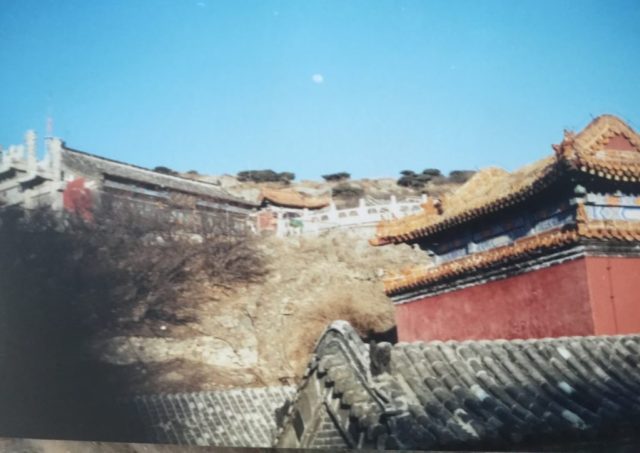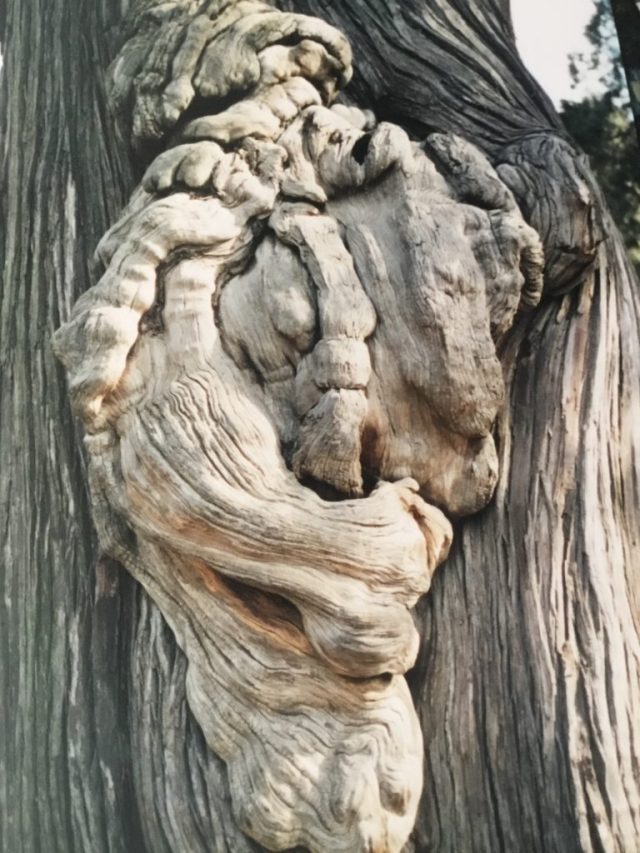 One of the young artists I met in Beijing had told me that there was a legend that anyone who climbed the Great Wall of China would be a hero. I’d been planning on climbing it anyway – but that just made it better. After that I spent three days exploring Beijing but then I actually had something that I had come to China wanting to do…
One of the young artists I met in Beijing had told me that there was a legend that anyone who climbed the Great Wall of China would be a hero. I’d been planning on climbing it anyway – but that just made it better. After that I spent three days exploring Beijing but then I actually had something that I had come to China wanting to do…

I don’t remember how I heard about Tai Shan (Mt. Tai) but back when I had been freezing in my VW Van in Seattle’s winter – I had somehow got it into my head that I was going to go to China and climb the Sacred Taoist mountain, Tai Shan. And so I found a train and set out.

Shandong Province, where Mt. Tai and the city of Taishan are is Southeast of Beijing. Traditionally, the province is known for being the place where the Yellow River empties into the sea and as the birth place of Confucius. It is also famous for Tai Shan which is one of the ‘Great Five’ mountains of China – the others being Heng Shan, Song Shan, Heng Shan, and Hua Shan. Each of them represent a direction – Tai Shan is East.

Tai Shan is also the holiest. It was climbed by every emporor, Mao, Confucius and famous writers. The legend I was told was that if you climb Tai Shan, then you will live to be 101 years old. Over 6 million people per year go to the peak of Tai Shan, but the majority of them take cable cars. There were no cable cars when I visited – and I wouldn’t have taken one anyway. Tai Shan is sacred to Buddhists and Taoists both.

Over thousands of years the 4,630 foot peak (1545 meters) has been scaled so many times that today there are 6660 steps which lead to the summit. At the bottom there are temples in the village of Tianwei, where one should pay respects to the gods before beginning. I prayed with many older people at the Dai Temple.

My fellow pilgrims included many older people, and amazing group of nurses, an army officer with a lame foot on crutches, and many others. We were all there to climb Tai Shan. There was a comaraderie among us – I felt it even as I wondered how some of them would possibly make it to the top.

I had take the train to Taishan from Beijing. On board I met a young student who offered to let me stay at his house. I declined because I wanted to get an early start and had already figured out that if I were a guest, it probably involved some obligatory drinking. Instead, I had taken a hotel room for two nights so I would have a safe place to leave my rucksack. There was lodging available at the top of Taishan in the monastary, which I wish I had taken advantage of – but my plan was to make it a day trip.

The path up the mountain is not a wild path. Huge characters had been carved into the mountain at every turn. Each natural feature had been sculpted for thousands of years. At the bottom, I walked with the crippled soldier and waited for him at a few checkpoints. He saw that I could move much faster and convinced me to leave him behind. I didn’t know what he was saying but it felt like “Just go and I will see you at the top!”
I moved up the mountain quickly, but not as quickly as the vendors who carried heavy burdens even balanced on the ends of poles that rested on their shoulders. At each resting point, vendors were selling water, snacks, trinkets, souvenirs. At the midpoint, the Midway Gate to the Temple of Heaven, there was a veritable bazaar.

I was the only white person I saw that day. At that time, Americans were still a rarity in China and for many of the Chinese I encountered, I was the first white person they had ever seen. I heard the term ‘laowei’ many times and was greeted and smiled at by nearly everyone. When I reached the top, I rested before crossing under the Gate to Heaven. The Chinese who came after me all smiled, shook my hand, congratulated me, and I could tell they felt proud of me – I was their ‘laowei’ by virtue of the journey we had made together. Laowei means white ghost and was a term I heard used for me over and over again during my time in China.

On the top, I found what can only be described as a village. I ate noodles, I prayed in a Taoist temple, I drank a beer. After several hours, I was resting near the top of the stairs and watched with pride as the crippled Army soldier hobbled through the gate of the Temple of Heaven. We acknowledged our shared accomplishment with a smile and a salute. There were tears in his eyes and I guess I should admit that I had some too. It felt like we were comrades, reunited. Before I started down, he motioned me over and reached into his pocket where he pulled out a small rolled piece of cloth. I don’t know what he was saying, but it felt solemn and important. He put the cloth in my hands and then clasped over them so I wouldn’t try to give it back. I put the cloth in my pocket and we parted ways. He was heading into the Heavenly City, probably to stay for several days and some devotion. I like to think that he found some healing there.

The journey down was fast but more exhausting. I really wish I would have stayed on top – but there is no going backwards. At the bottom, I bought some trinkets as souvenirs from vendors selling old things – a belt of turtles carved of stone, a box made of bone, and three silver Chinese coins. When I got back to my hotel, I remembered the cloth and took it from my pocket. It was an old silk portrait of Chairman Mao. I think it was the kind of thing that people used to put on their uniforms. I was sure that it had come from his uniform and he had carried it up the mountain for strength and purpose. It became one of my sacred treasures.

In the village, I ate a meal that I didn’t know the name of and drank a Tsingtao (also from the same province). I would live to be 101 and would become a hero. I was no longer feeling like a homeless guy from Seattle in China– I decided to cleam myself up a little. Something changed in me on that day and I’ve never been the same since. I am fully confident that I actually will live to be 101 years old. I have also carried a strange certainty that the crippled soldier and I will someday cross paths again.

